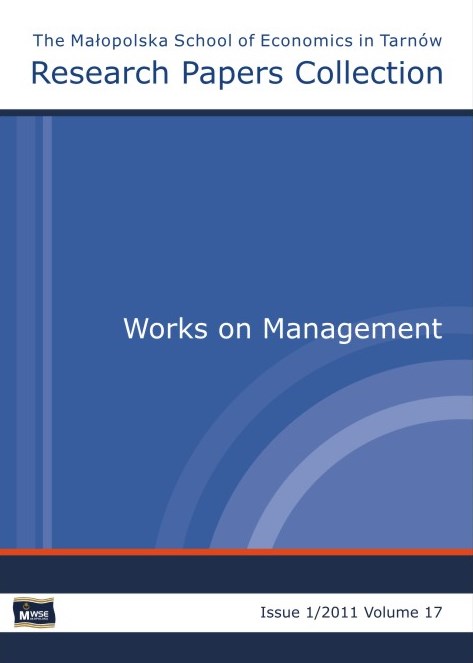Abstract
The key issue which decides about survival and success in the global market, under the conditions of the economy based on knowledge, is the capacity of the company to system-based creating and implementing innovation. In the business practice, innovations are a significant factor to support execution of the development strategy of companies, but also of the whole economy, by enabling renewal of industrial structures or contributing to development of new sectors in business activities. Due to the increasing of these phenomena of conversion in the scope of cultural patterns according to new requirements of the global economy, they now become one of the basic problems which almost all companies all over the world face these days. Company culture is understood as fixed patterns of thinking and behaviour of employees, developed by attitudes and behaviour of the management. It permeates the processes of both formulating the strategy and executing it. The company which understands its culture may use this knowledge as a source of strategic power. The objective of the paper is to present the results of diagnosis of organisational culture in terms of its proinnovativeness. In the first stage of the study, on the basis of the obtained results of descriptive and questionnaire studies, the model of organisational culture in each of the companies was produced. The next stage of the study consisted in defining the culture required in the studied entities due to the strategy executed by them. First, the strategy of the studied companies was determined, and then the type of desired culture which enables proper execution of the strategy. The final stage of the study consisted in indication of directions and areas of changes in the current organisational culture. The cultural models of the studied companies developed on the basis of the conducted study and presented in the paper show complexity and specific nature of the practised values and culture standards which may support or limit the capacity to manage innovative activities.
References
Cameron K.S., Quinn R.E., Kultura organizacyjna – diagnoza i zmiana: Model wartości konkurujących, przeł. B. Nawrot, Oficyna Ekonomiczna, Kraków 2003. ISBN 83-89355-03-5.
View in Google Scholar
Czerska M., Zmiana kulturowa w organizacji. Wyzwanie dla współczesnego menedżera, Wydawnictwo Difin, Warszawa 2003. ISBN 83-7251-342-2.
View in Google Scholar
Johannessen J.-A., Olsen B., Lumpkin G.T., Innovation as newness: What is new, how new, and new to whom?, „European Journal of Innovation Management” 2001, no. 1.
View in Google Scholar
Wojtowicz A., Diagnosing methodology outline of the organisational culture, „The Małopolska School of Economics in Tarnów Research Papers Collection” 2010, issue 2 (16).
View in Google Scholar
© Copyright by Małopolska School of Economics in Tarnów. The articles are available under the Creative Commons Attribution NonCommercial-NoDerivatives 4.0 International License


